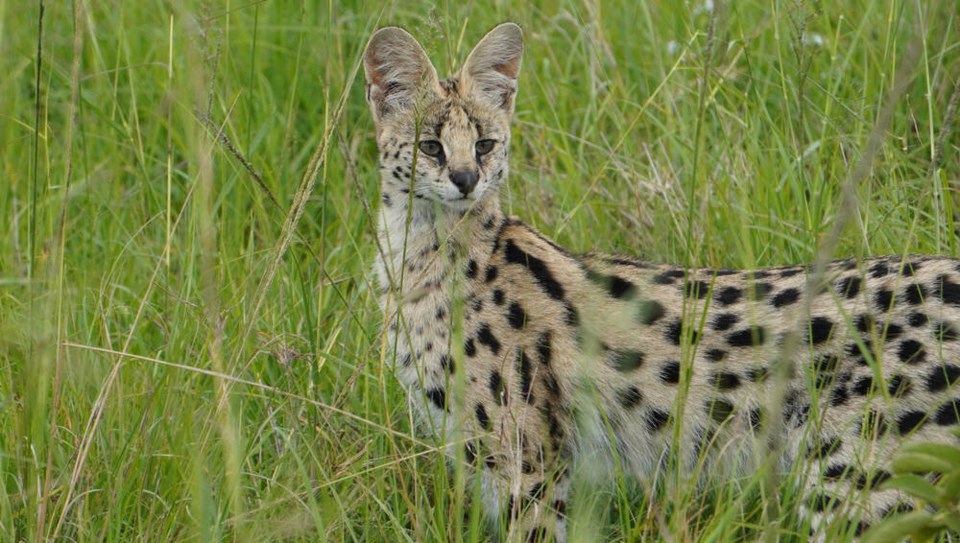One of two African servals on the loose near Qualicum Beach has been recaptured, but the other — a pregnant female — was unaccounted for Wednesday night.
Owners Laurel Bablitz and Bill Edwards, who live in Corcan-Meadowood, believe someone let the exotic cats out of the enclosure on their property.
“I opened the door and looked and the door for the cage was open,” Bablitz told CHEK News on Wednesday. “I knew they were gone, but I ran over and had a look and they weren’t in the cage.”
Bablitz said they had joked about keeping the cage secure “because if they get loose, we’re never going to catch them.”
Edwards said the cats, which have been in their possession for about a month, were quite expensive.
“They’re $20,000 cats. They’re our pets,” he said. “And the male is wondering where she is. We caught the male. And we just feel terrible. Haven’t slept properly in three days. We’re really hurting about this.”
B.C.’s Conservation Officer Service was notified by the servals’ owner on Tuesday that the cats were loose. But because servals can be legally owned and are considered domestic pets — not wildlife — they don’t come under the conservation service’s mandate.
It’s unclear what someone should do if they spot one of the cats, though the conservation service said not to approach them. Coastal Animal Control Services said it handles only dog complaints in the Regional District of Nanaimo.
Dr. Sara Dubois, chief scientific officer with the B.C. SPCA, said Wednesday that a complaint was made in the previous 24 hours about the servals. “Neighbours are concerned.”
The servals are believed to have killed a domestic cat, and the B.C. SPCA says residents should be vigilant, keep pet cats indoors and ensure dogs are on leashes when outdoors.
Dubois said she would not try to catch a loose serval, not knowing how it would react to a stranger.
SPCA officers will be following up with the owner to ensure the animals are being properly taken care of, she said.
The SPCA has been lobbying for several years for servals to be covered under the province’s Controlled Alien Species Regulations.
The area where the exotic cats were spotted is within the Regional District of Nanaimo, which does not have a bylaw restricting ownership of servals, although nearby Qualicum Beach does not permit servals, said Dubois.
The province can remedy the “patchwork” of regulations that currently covers servals by adding the animals to its list of banned exotic animals, she said. “They put the most dangerous animals on that list initially, but they didn’t cover off some of the medium-sized wild animals from other countries, like serval cats from Africa.”
Another factor is the safety of the animals when they are on the loose, since it’s not uncommon for serval cats to have been declawed, Dubois said. Escaped servals have died after being struck by cars or from starvation because they did not learn how to hunt in the wild.
B.C. SPCA says servals have a poor quality of life when kept as pets. They retain their wild instincts and are “cunning escape artists” that are difficult to contain in a home or in an enclosure, but can can be a danger to the public and local wildlife if they escape, the organization said.
In 2019, the B.C. SPCA seized 13 serval cats from “horrific conditions” near Kamloops. The animals were sent to sanctuaries in the U.S.
The San Diego Zoo says servals can weigh up to 40 pounds (18 kilograms) and stand up to two feet (60 centimetres) high at the shoulder. Their coat is a tawny colour with black lines and spots and a white underbelly.
They have the longest legs and largest ears in relation to their body size of any cat.
Their extra-long neck has led to their nickname “giraffe cats,” the zoo says.
>>> To comment on this article, write a letter to the editor: [email protected]



